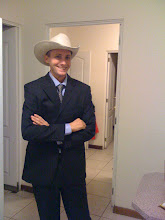This blog started as an email I was composing in my head for my father. His (justified) concern over the curriculum at UFM amuses me, as it's been made clear I'll never have to agree with it. I may need to understand the theories of Mises and Hayek; it's even possible I'll be required to argue in their favor. As someone fascinated with argumentative writing, economics and new ideas (the former two only from a distance -- only as much as a molecular biologist can handle), that's okay. It'll be hard to convince me that the Koch brothers, the Heritage Foundation, the Tea Party or anyone else in that arena belongs in politics, though. No mention has been made of these groups, but the connection between them all and the mission of my university are all intimately connected.
Today after class, I officially enrolled in courses for next year. Very exciting...nothing was as exhilarating in this whole process as when I received the email telling me I had been accepted, but each step I get closer to being a physician, the happier I am...each passing day brings me even closer. :) But I digress...
After enrolling in class, I was pretty hungry, so I headed to the library. Contrasting with Free Speech Movement Cafe in Moffit Library at UC Berkeley, I dined at the Bagel Factory inside La Biblioteca Ludvig von Mises (the Ludvig von Mises Library). Instead of attending lectures in Wheeler Hall, home to many Free Speech Movement events and now Occupy Berkeley events, I'll be trekking to the Milton Friedman Auditorium. Toto...we're not in Kansas anymore. I'll leave it to my father to draw the link between the likes of Bancroft, Moffit, and Wheeler with Mises, Hayek and Friedman (give him a week, perhaps a Tea Party talking point, and it'll be there), but, needless to say, it's pretty striking to have gone from a school so liberal as Berkeley to such a conservative school down here.
The other striking characteristic is the demographics in class. High school was upper-middle class rich, white kids from the suburb I grew up in. UC Berkeley was a mix of mostly upper-middle class kids from the suburbs of LA. I then went out to the real world where, between work, my friends and just living in Oakland, my day to day interactions were as diverse as it can get. Upon moving, my interactions were limited to patients more than anyone else -- poor, working families. I have since returned to high school, but even more exaggerated. Not only do they have vehicles, but for many, it means a BMW. They are still accustomed to the "high school life" where there's enough time for plenty of party. At least this is the impression I'm given. We've been lectured constantly this month about how tough medical school will be and, to top it off, our parents are required to come January 5. Yes...parents are required to come, that means YOU Mom and Dad. Granted, the average entry age is roughly 18 instead of 25, but it will be tough adjusting to being babied so much. After conquering UC Berkeley, the MCAT and seven seasons of Golden Girls, I can handle anything.
There's no doubt that with such a big change, the good, the bad and the ugly will come to me. I suppose I'm just hoping the bad and the ugly will at least treat me as an adult. I can't wait to see how the first year goes. Writing essays and participating however I'm required to in rhetoric will be especially interesting. Who's game for proofreading my horrible written Spanish?
